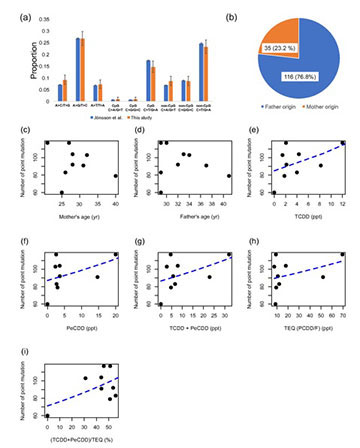People exposed to dioxin can have genetic mutations
Solving the entire genome sequence (genome) of the dioxin victim family shows that new mutations of germ cells in exposed father can be inherited to children.
During the Vietnam War between 1961 and 1972, the United States sprayed more than 19 million gallons (72 million liters) of a mixture of herbicides, including Agent Orange (Agent Orange ) into South Vietnam.
After more than 40 years, hot spots such as Da Nang and Bien Hoa airport areas (Dong Nai) are still heavily contaminated with dioxin . The concentration of dioxin in blood or milk of exposed people increased quite high.
To find out the effects of dioxin on the human genome, especially for the offspring of exposed victims, Dr. Nguyen Dang Ton and his colleagues at the Genome Research Institute, Academy of Science and Public Vietnam Technology (VAST) has carried out the project: "Research on genetic changes and chromosomes in people with high blood dioxin levels". The subject of the National Science Program (2011-2015) is managed by the Ministry of Natural Resources and Environment.

De novo point mutations in the offspring of victims of dioxin exposure.
The scientists focused on new mutations of the germ cell line (de novo) that occur during cell division in germ cells , also called parents' germ cells. This mutation differs from somatic cell mutation (soma) that occurs during embryonic development.
Dr. Ton said, the group solved the entire genome sequence of nine victims' families exposed to Agent Orange / dioxin. These are the first parents-to-child families (total of 27 people) in Vietnam as well as in the world, whose father was exposed to elevated blood dioxin levels and unexposed mothers.
The results of the study found 846 de novo point mutations, 25 de novo segment insertion / loss, four mutations that changed de novo structure and a loss of de novo fragment in nine families.
The group also found de novo mutations in children with mental retardation and muscular atrophy, related to muscular dystrophy. De novo mutations or deletions are also recorded in some children of victims of Agent Orange / dioxin exposure.

De novo mutations lose a segment on a child's chromosome.
By the method of correlation analysis, scientists believe that there is a correlation between the number of de novo point mutations and dioxin concentration."These are new scientific evidence, the first in the world to show that dioxin has an effect on the rate of new mutations of germ cell lines in exposed father. These mutations are inherited to the offspring. " Mr. Ton said.
The study was published in the International Journal of Human Mutation published in the US, the magazine ranked IS 24/171 (Q1) magazine Genetics and Heredity and ranked 10/100 by SCIMAGO ( Q1) Journal of Clinical Genetics (Clinical Genetics).
According to scientists, the average dioxin concentration in Agent Orange is 13 mg / kg, much more durable than other herbicides 2,4 D and 2,4,5-T - both Substances are prohibited for use in the US and many other countries due to its toxicity to the environment and organisms. The half-life of dioxin in human body is estimated to be 7-11 years. This extremely toxic substance is the leading cause of cancer in humans.- 10 types of gene mutations are most common in humans
- Building dioxin detoxification center in Da Nang
- Each person has about 60 gene mutations
- Women with dioxin have fewer sons than girls
- Dioxin exposure: The risk of birth defects is 14 times higher
- DNA clamps help diagnose genetic mutations that cause cancer
- Why do healthy people still have cancer?
- Does genetic mutation help humans live longer than 100 years?
- Does the genotype decide who will become a murderer?
- Joining hands to ease the pain of Agent Orange
- Differences like twins and eggs
- IPTD technology to treat dioxin in Da Nang airport
 Green tea cleans teeth better than mouthwash?
Green tea cleans teeth better than mouthwash? Death kiss: This is why you should not let anyone kiss your baby's lips
Death kiss: This is why you should not let anyone kiss your baby's lips What is salmonellosis?
What is salmonellosis? Caution should be exercised when using aloe vera through eating and drinking
Caution should be exercised when using aloe vera through eating and drinking